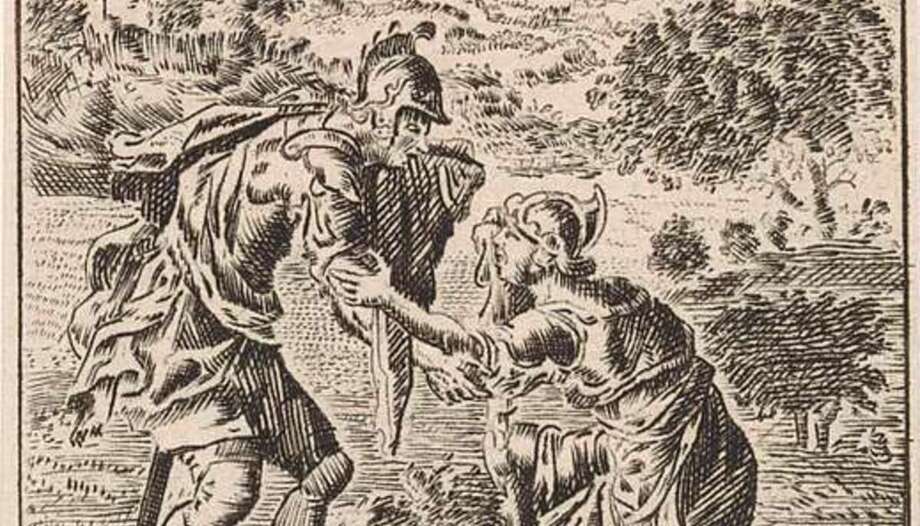History and literature record great friendships on the human level.
One of the best known is that of David and Jonathan. This endearing friendship, probably the best example of friendship in the Old Testament, was confronted by Saul, Jonathan's father, who envied David to the point of ordering his assassination, so that David had to flee from the court. When he found out, Jonathan - Saul's eldest son and heir - sided with his friend David.
Saul, rejected by God and killed on the battlefield against the Philistines, lost the throne, which passed to David, the new king.
Another famous friendship is that of Pylades and Orestes. Clytemnestra, unfaithful wife of Agamemnonsent his son Orestes - so that he would not witness his infidelity - to the care of King Strophios of Phocis. Orestes grew up there in friendship with Pylades, son of the king. On his return from Troy, Agamemnon was killed by Aegisthus, his wife's lover.
Orestes, with the help of Pylades, killed Clytemnestra and Aegisthus, after which the two sailed to the borders of Scythia. Arriving in the country of Tauros, Orestes fell to the ground affected by his usual madness and lay on the ground; Pylades wiped off the foam and cared for his body.
Each of them offered to save the life of the other. In the end, both were saved, and Orestes reigned in Mycenae and Pylades in Electra.
Other close friendships were those between Roland and Oliveros and between Amis and Amilis, in the time of Charlemagne.
Closer to us, Ratzinger has left us some luminous ideas about faith, as a superior form of love, in many of his works, among others in his Introduction to Christianity. And I would like to recall here some of those ideas that have not lost their relevance.
In the leaden solitude of a world orphaned of God, in its inner boredom, the search for the divine has reemerged. In the face of the somber and devastating ecstasy of drugs, of asphyxiating rhythms, of noise and drunkenness, we find the diaphanous light and the admirable discovery of the sun of God.
The future is built where men meet each other with convictions capable of shaping life. And the good future grows where these convictions come from the truth and lead to it.
There are, however, some scandals for the life of faith today:
-The distance between the visible (what surrounds us, the palpable reality) and the invisible (God, faith).
- The distance between progress (that which drives toward the future) and tradition (faith as something of the past, even in the clothing of the religious).
Every human person has to take a stand in some way in the area of fundamental decisions, and this can only be done in the form of faith. There is an area in which there is no other response than that of faith, which no one can avoid. Every human being has to believe in some way.
But what is faith properly speaking?
Faith is a way of situating the human being in the face of reality.
Man does not only live on the bread of the feasible; he lives on the word, on love, on meaning. Meaning is the bread on which man feeds in his innermost being. Orphaned of word, of meaning and of love, he falls in the "life is no longer worth living", even if you live in extraordinary comfort.
Believing in Christ "It means trusting in meaning, which sustains me and the world, considered as the firm foundation on which I can stand without fear".
Therefore, it cannot be denied that the Christian faith constitutes a double affront to the predominant attitude in the world today... The primacy of the invisible over the visible and of receiving over doing, runs in the complete opposite direction to the predominant situation today.
But faith does not mean placing oneself blindly in the hands of the irrational. On the contrary, it means approaching the "logos", the ratio, the meaning and, therefore, the truth itself.
Christian faith is much more than an option in favor of the spiritual foundation of the world. Its key statement does not say I believe in something, but rather I believe in something. "I believe in you", in the immediate and vigorous character of his union... with the Father, in Jesus, the witness of God, through whom the intangible becomes tangible and the distant becomes near; he is not a pure and simple witness... he is the presence of the eternal in this world. In his life, in the unreserved surrender of his being to mankind, the meaning of the world is made present.
"Are you really...?". The honesty of thought compels us to ask ourselves these questions even though to very few the divine manifests itself in an evident way.







